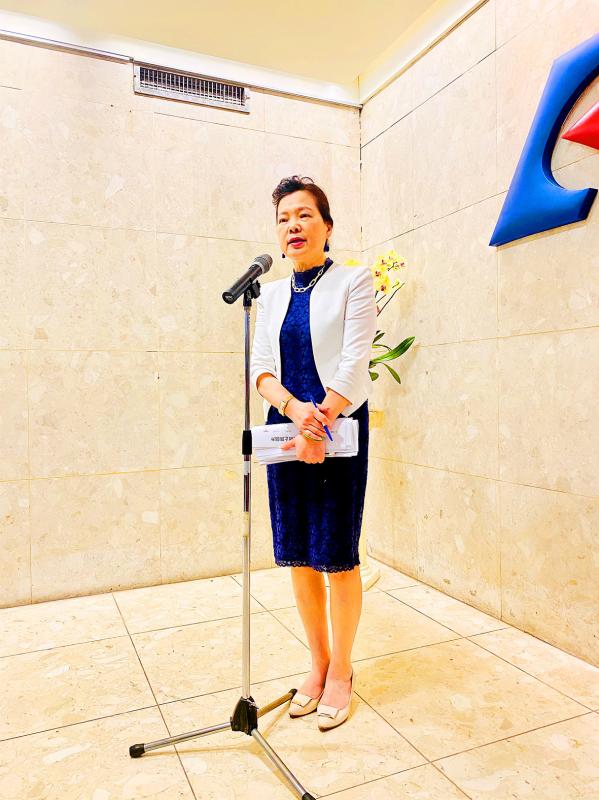The Ministry of Economic Affairs (MOEA) yesterday said that it hopes to begin accepting applications next month from the manufacturing and exhibition industries for the government’s “Stimulus 3.0” program.
The ministry is keenly aware that many traditional manufacturers, as well as the shows and exhibition industries, are in urgent need of relief amid a COVID-19 pandemic slowdown, Minister of Economic Affairs Wang Mei-hua (王美花) told reporters.
The ministry has already asked the Executive Yuan for funding, Wang said.

Photo: Huang Pei-chun, Taipei Times
“We are waiting right now, but we expect approval within days so that we can start processing the relief,” she said.
When asked about a possible time frame, she said that the ministry is aiming for “early to mid-September.”
“We will make an announcement as soon as the approval is given,” Wang said.
The budget request pending approval anticipates third and fourth-quarter needs for this year, Wang said.
The ministry is seeking NT$20 billion (US$677.74 million) for each quarter, she said.
Last month’s data showed that the retail and the food and beverage sectors have recovered well, Wang said.
The stimulus program is to help businesses still down by more than 50 percent year-on-year, she added.
The government spent NT$200 billion in the Stimulus 2.0 program to help virus-stricken businesses, but the funds ran out in the middle of last month so that program was ended early, Wang said.
When asked about the ministry tightening rules against Chinese business interests, Wang said that in addition to more regulation of Chinese firms investing in Taiwan, the ministry is also clarifying statutes governing information transfer to China.
“After our clarification, any skill transfers or licensing agreements that are technical in nature must be approved by the ministry,” Wang said.
There are no further plans to expel companies that are backed by Chinese capital, despite the Investment Commission ruling that Taobao Taiwan (淘寶台灣) is a Chinese company, she said.

South Korea’s equity benchmark yesterday crossed a new milestone just a month after surpassing the once-unthinkable 5,000 mark as surging global memory demand powers the country’s biggest chipmakers. The KOSPI advanced as much as 2.6 percent to a record 6,123, with Samsung Electronics Co and SK Hynix Inc each gaining more than 2 percent. With the benchmark now up 45 percent this year, South Korea’s stock market capitalization has also moved past France’s, following last month’s overtaking of Germany’s. Long overlooked by foreign funds, despite being undervalued, South Korean stocks have now emerged as clear winners in the global market. The so-called “artificial intelligence

NEW IDENTITY: Known for its software, India has expanded into hardware, with its semiconductor industry growing from US$38bn in 2023 to US$45bn to US$50bn India on Saturday inaugurated its first semiconductor assembly and test facility, a milestone in the government’s push to reduce dependence on foreign chipmakers and stake a claim in a sector dominated by China. Indian Prime Minister Narendra Modi opened US firm Micron Technology Inc’s semiconductor assembly, test and packaging unit in his home state of Gujarat, hailing the “dawn of a new era” for India’s technology ambitions. “When young Indians look back in the future, they will see this decade as the turning point in our tech future,” Modi told the event, which was broadcast on his YouTube channel. The plant would convert

‘SEISMIC SHIFT’: The researcher forecast there would be about 1.1 billion mobile shipments this year, down from 1.26 billion the prior year and erasing years of gains The global smartphone market is expected to contract 12.9 percent this year due to the unprecedented memorychip shortage, marking “a crisis like no other,” researcher International Data Corp (IDC) said. The new forecast, a dramatic revision down from earlier estimates, gives the latest accounting of the ongoing memory crunch that is affecting every corner of the electronics industry. The demand for advanced memory to power artificial intelligence (AI) tasks has drained global supply until well into next year and jeopardizes the business model of many smartphone makers. IDC forecast about 1.1 billion mobile shipments this year, down from 1.26 billion the prior

People stand in a Pokemon store in Tokyo on Thursday. One of the world highest-grossing franchises is celebrated its 30th anniversary yesterday.